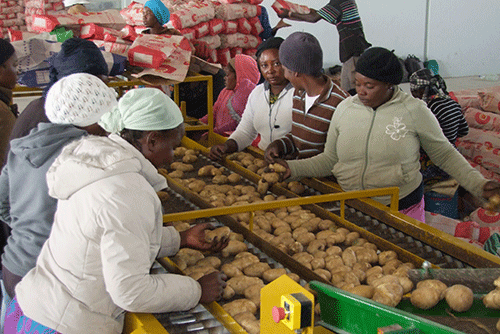TSANDI – A shortage in the local supply of fresh produce, specifically potatoes and carrots, has had adverse effects on prices, the operations officer of the Agro Marketing and Trade Agency’s (AMTA) Ongwediva Hub, Mathew Petrus, has said.
Petrus told Nampa at the Tsandi Trade Fair and Expo that local farmers have been supplying limited quantities of potatoes and carrots in recent months.
“As you might have noticed, the prices of potatoes and carrots are extremely high in our shops because we are importing them,” he said.
Petrus said local farmers should capitalise on the opportunity to grow potatoes and carrots for the local market.
He pointed out that Namibia currently relies heavily on imports for over 70% of its potatoes and carrots, making these vegetables relatively expensive, with a seven kilogramme bag of potatoes selling for nearly N$200 at the moment.
Auguste Fabian, the spokesperson of the Namibian Agronomic Board (NAB), said Namibia imports approximately 4 000 tonnes of potatoes every month.
She explained that local potato production faces challenges due to high temperatures during the summer, making winter the optimal season for cultivation.
However, even then, the amount produced is not enough to meet local demand.
Fabian noted that South Africa is also grappling with a scarcity of these commodities.
“As a result, demand is high and supply is low, and the common rule is that the lower the supply of the commodity, the higher the price,” she said.
She further noted that farmers encounter difficulties in accessing quality potato seeds and NAB is therefore collaborating with the University of Namibia to develop adaptable seeds with higher yields.
Regarding carrots, Fabian said Namibia has achieved over 70% self-sufficiency in production.
“However, due to weather patterns, October and early November are usually off-season due to high temperatures, hence the local shortages in supply and the current opening of borders for pro-rata importation,” she explained.
Fabian also pointed out that Namibia imports 95 per cent of its fruit from South Africa, especially due to the unsuitable climate for apples and pears.
She encouraged farmers to shift their focus to potatoes and fruit, which offer substantial market opportunities.
– Nampa



